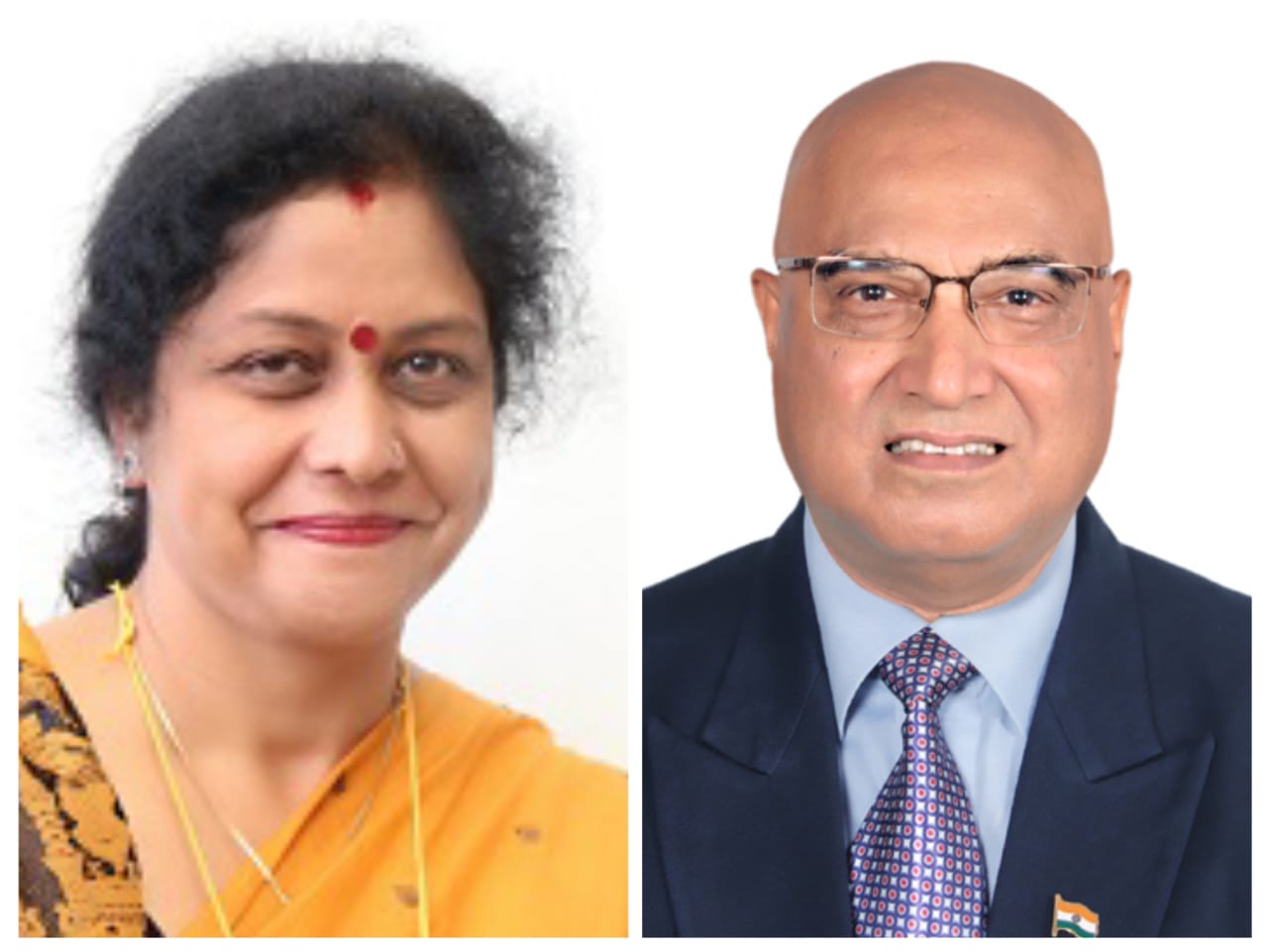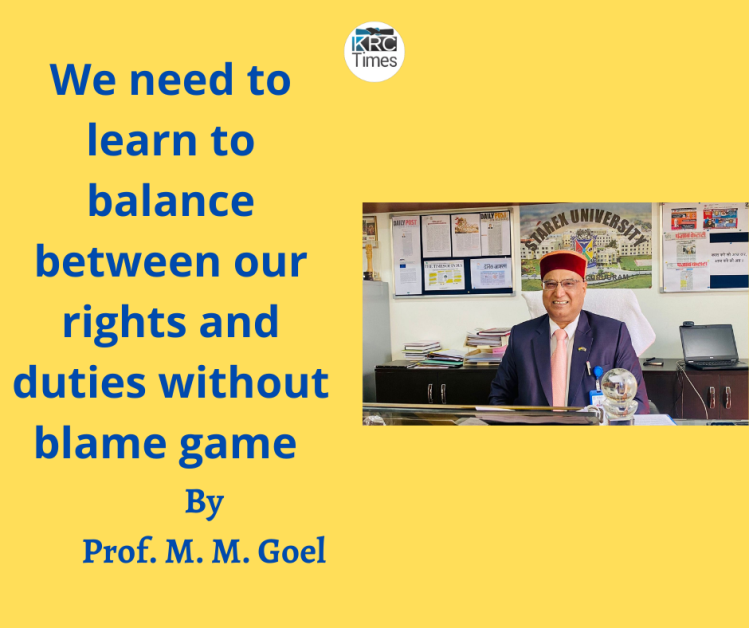To strengthen democracy in India, we have to understand the role of academicians as architects in enhancing voting rate which varies between 60 to 70 percent in elections .It is pertinent to mention the voting rate is more in local government elections than assembly elections which are higher than the parliamentary elections in India
 KRC TIMES Desk
KRC TIMES Desk

Professor Rashmi Bhardwaj & Professor Madan Mohan Goel
To strengthen democracy in India, we have to understand the role of academicians as architects in enhancing voting rate which varies between 60 to 70 percent in elections .It is pertinent to mention the voting rate is more in local government elections than assembly elections which are higher than the parliamentary elections in India.
Academicians play a pivotal role in shaping the trajectory of a nation’s democracy, and their contributions are indispensable in fostering a robust and inclusive democratic system. We must ponder over some thoughts on the relevance of academicians in strengthening democracy in India:
Knowledge Creation and Dissemination: Academicians are at the forefront of knowledge creation through research, critical analysis, and scholarly discourse. Their insights into political processes, governance structures, and societal dynamics are crucial for informing policymakers, civil society, and the public about the complexities of democracy. By disseminating their research findings through publications, conferences, and public engagement, academicians contribute to a more informed and enlightened citizenry, which is essential for the sustenance of democracy.
Policy Formulation and Evaluation: Academicians possess expertise in various fields such as political science, law, economics, sociology, and public administration, which are instrumental in formulating and evaluating democratic policies. Their research inputs and recommendations can guide policymakers in designing evidence-based policies that uphold democratic principles, promote social justice, and address the needs of diverse communities. Moreover, academicians can serve as independent evaluators of government programs and policies, providing constructive feedback and accountability mechanisms to ensure transparency and effectiveness in governance.
Critical Thinking and Civic Education: Academicians cultivate critical thinking skills and promote civic education among students and the broader society. By imparting knowledge about democratic principles, constitutional values, human rights, and civic responsibilities, they empower citizens to actively participate in democratic processes, exercise their rights, and hold elected representatives accountable. Through interdisciplinary approaches and experiential learning methods, academicians can foster a culture of democratic citizenship, tolerance, pluralism, and respect for dissenting opinions, which are essential for nurturing a vibrant democracy.
Advocacy and Activism: Academicians often engage in advocacy and activism to advance democratic reforms, social justice causes, and human rights agendas. Whether through public lectures, policy briefs, media appearances, or grassroots mobilization, they raise awareness about pressing issues, challenge authoritarian tendencies, and promote inclusive governance practices. By leveraging their intellectual capital, moral authority, and institutional networks, academicians can galvanize public support for democratic movements, institutional reforms, and legislative initiatives aimed at strengthening democratic institutions, enhancing electoral integrity, and safeguarding civil liberties.
International Collaboration and Comparative Studies: Academicians contribute to global conversations on democracy through international collaboration, cross-cultural exchanges, and comparative studies. By analyzing democratic experiences and best practices from around the world, they enrich academic discourse, broaden perspectives, and identify lessons that can be adapted to the local context. Through collaborative research projects, academic conferences, and academic exchange programs, they foster mutual learning, solidarity, and cooperation among scholars, practitioners, and policymakers striving to promote democratic governance and peacebuilding efforts.
Increasing voter turnout requires a multifaceted approach that addresses various barriers and motivators to voting. We must develop strategies to enhance the voting rate in the 2024 elections:
Voter Education and Awareness Campaigns: Launch comprehensive voter education campaigns to inform citizens about the importance of voting, voting procedures, polling locations, and key issues at stake in the elections. Utilize various communication channels such as social media, television, radio, print media, and community outreach programs to reach diverse demographics and linguistic groups.
Civic Engagement in Schools and Universities: Introduce civic education programs in schools and universities to instill a sense of civic responsibility and democratic values among young people. Organize mock elections, debates, and voter registration drives on campuses to encourage student participation and political awareness.
Accessible and Convenient Voting Options: Expand access to voting by implementing measures such as early voting, extended polling hours, absentee/mail-in voting, and mobile polling stations. Ensure that polling stations are located in easily accessible locations, including public transportation hubs, community centers, and densely populated areas.
Voter Registration Drives: Conduct intensive voter registration drives targeting underrepresented communities, marginalized groups, and eligible voters who have not yet registered. Collaborate with community organizations, faith-based institutions, and grassroots movements to reach out to hard-to-reach populations and provide assistance with voter registration processes.
Language and Disability Accommodations: Provide language assistance and accommodations for voters with disabilities to ensure inclusivity and accessibility at polling stations. Offer ballot materials, voting instructions, and assistance in multiple languages, as well as facilities and equipment for voters with disabilities, such as wheelchair ramps, braille ballots, and sign language interpreters.
Community Mobilization and Peer Influence: Mobilize community leaders, influencers, and grassroots organizations to encourage voter turnout within their respective communities. Utilize peer-to-peer outreach, door-to-door canvassing, and community events to engage voters, build trust, and promote a culture of civic participation.
Campaign Finance Reform and Electoral Transparency: Implement campaign finance regulations to mitigate the influence of money in politics and enhance electoral transparency. Strengthen enforcement mechanisms to ensure compliance with campaign finance laws and regulations, and promote accountability and integrity in the electoral process.
Public Recognition and Incentives: Recognize and incentivize civic participation by acknowledging individuals and organizations that actively promote voter turnout. Offer incentives such as discounts, vouchers, or public recognition for voters who participate in elections, and collaborate with businesses, media outlets, and civil society organizations to promote civic engagement initiatives.
In brief, academicians play a crucial role in strengthening democracy in India through knowledge generation, policy guidance, civic education, advocacy, and international collaboration. By implementing strategies to enhance voter turnout in the 2024 elections and addressing structural inequalities, India can foster a more inclusive and representative democracy.





